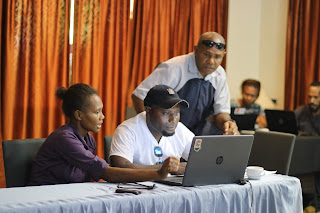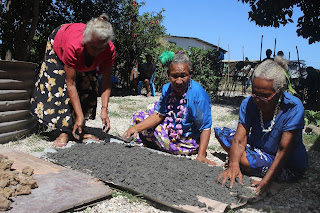HIRI WOMEN EYEING GARMENT FACTORY
Reducing barriers to women’s involvement in Global Trade was the topic of discussion during the women in economy forum held at the convention centre last September during one of the cluster meetings leading up the APEC summit.
The discussion focused on women entrepreneurs and women owned businesses and MSMEs that can benefit from incentives such as trade agreements, market accessibility, financial literacy programs among others. Gender expert and Professor in Law from Macquarie University Dr Vijaya Nagarajan, highlighted the need to link trade related policies to women’s empowerment, promote women’s voices through appropriate entities and work in partnerships to identify markets to reach them.
While there’s continuous discussions going on, some Papua New Guinean brave women have already gone into the business of trading, running financial literacy programs in their respective communities, skills development among others and are contributing to nation building. Their stories are heartwarming and have been adored and seen as role models.
One such entrepreneur is located in the Hiri district of Central Province. Just few minutes’ drive out of Port Moresby city is Boera village. A Motuan community whose land now hosts the multi-million-dollar Liquefied Natural Gas processing facility.
Among its mixture of traditional and modern ways and other developments taking place in this fishing village a tailoring business is blooming and seen as a window of opportunity by the women of Boera and the nearby villages.
Diari Tailoring is owned by Doreka Dai, a Boera women who has sacrificed her job with the PNG LNG Project to venture into the garment industry.
Having already an established business and skills she has attained over the years in sewing, she left her highly paid job to venture into an industry that is yet to be fully realized in her community. She thought putting her women folk first was a good idea and providing basic life skills is a way forward for her womenfolk.
Doreka Dai.
During construction of the PNG LNG project, she realized that women had the potential to succeed, but needed someone from the community to take the lead. She had to be that leader to impart skills in sewing.
‘’I made the sacrifice of coming back to the community and sewing skills was a need. I felt this skill will benefit families, so I went about assisting women on basic sewing’’, she said.
It was until ExxonMobil stepped in to help through Advancing PNG: Women’s Leaders Network that got a sewing and sewing machine care and maintenance training.
In August of 2018 the train the trainer training came into fruition and was held in Boera village. 40 women from Papa, Lea Lea, Porebada and Boera villages attended a 11-day training. They all graduated with Advanced Tailoring and Sewing Machine Care and Maintenance certificates afterwards.
It was a very constructive two weeks of learning advanced tailoring skills such as designing patterns, tracing and cutting, iron-on interfacing and learning to use an over locker; ultimately producing garments that are similar to factory quality.
Participants also learnt sewing machine and operator safety, identification of machine parts and functions both internal and external. This has enabled them to identify the cause of mechanical problems, fix faulty machines and undertake preventative maintenance to keep machines functioning well.
Their goal was to go back into their communities and be able to impart their skills to other women straight after attending the program. This was also the right time for facilitators Doreka and Kofe Ibu a former community development officer, brought in from his Daga village in Kutubu to co-facilitate the training
‘’we just don’t want them to be lazy, we want them to fully realise their potential to be successful in life.’’ Mrs Dai said.
“All these skills were shared without holding back at anything with the dream that these communities living right next to the Nation’s Capital will one day produce quality garments and supply the clothing demand of the population in Port Moresby. It is with this dream that the seed for a garment factory is sowed in these participants,” said Mr Ibu.
''we want them to fully realise their potential to be successful in life. We want to see a family improve, we want families to be reliant on their skills. When we train a woman, I definitely know that skill will be passed down to her daughter, grand daughter and help the family economically. This is my dream. I want to see my women folk to be successful, said Ms Dai.''
One amazing result of the training was the story of an 18-year-old faulty sewing machine which was fixed by its owner, Ameri Nao of Papa village.
‘’I was amazed. I Couldn’t believe it. The machine was sitting idol in the house. From time to time, my kids wanted to throw it away but I kept it. I’m so happy that I finally got to fix it. This training has helped me a lot. I’m now enjoying myself sewing’’, said Ms. Nao.
Fast forward to this year and as per APNGWLN report, the 32 participants then trained a total of 145 women and both the 32 participant and their trained women sewed a total of 590 garments. From the 590 garments sewn, 414 were sold for money and the other 131 were given to family members and others for personal use. The four villages together raised a total amount of PGK 13, 890 from what they had sewn.
From the four villages, women from Lealea earned the highest amount of money which is K6819 from the garments they had sewn (245 garments) than the other three villages. The second was Boera with K4575 with a total of 142 garments sewn.
‘’It was their determination and passion that lead me to help and assist women who are also in my network. For me it’s a dream come true to see women unleash their potential through such training programs. We encouraged our women here not to look for funding but, make things happen. They’ve got to be self-reliant in order for funding agencies or philanthropist to see the benefits in their communities so they can come in and assist’’, Mrs. Dai said.
For Doreka, her business came about after attending a global women management program funded by ExxonMobil that automatically made her a member of Advancing PNG: Women Leaders Network. The training program paved way for her connecting with different women leaders in the country. A community leader herself, wanted to see her people embrace change and be proactive in their village.
So, one might want to know what their plans are after all these training and skills building? Well! They have collaborated, networked, have the skills and are already thinking of something big. They are confident, prepared and would like to approach their Landowner company to build a garment factory in the near future.
‘’Instead of going into Moresby to buy school uniforms, we want to sew and supply form here. We would also like to transform how our women dress, our children, our husbands and take them to the next level. In that way we are advancing them to greater opportunities’’, Ms. Dai.
This envisioned dream they have will empower them economically and have positive impact in their community. The more involved they are, their families grow, reducing barriers to accessing the labour market. Increasing their participation in the economy also means for them to be self-reliant and have economic autonomy. When women have their own incomes, their status and bargaining power in the family increase as well as their quality of life.
While action is needed to better integrate women into this kind of trading system. All the evidence suggests that giving an equal economic chance to women is not only economically important; it results in beneficial outcomes for a society as a whole. Investing in women - and empowering women to invest in themselves - is a risk-free venture. While their dream of owning a garment, factory is in working progress, the evidence of what they learnt so far is obvious in their households. For Doreka, her dream of empowering her women folk is gradually making a difference in her community.
Meantime APNG: WLN President Seini Fisi’ihoi said empowering women folk contributes positive developments in their family and community as a whole.
“With our vision to ensure every woman and girl fulfills her full potential, we are excited to continue providing access to resources and connections that will help these participants make their plans and dreams a reality,” said Seini Fisi’ihoi, President of APNG: WLN.
END!!








Comments
Post a Comment